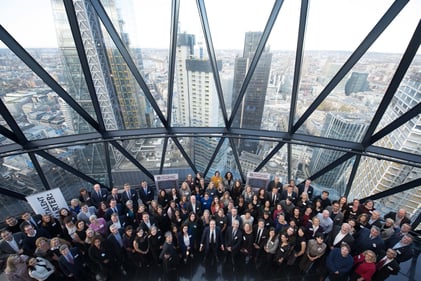As the Corsham Institute and RAND Europe launch their ‘Observatory for a Connected’ Society app and their ‘Building our Connected Society’ report, techUK President Jacqueline de Rojas maps out how we can build a connected society today.
The digital revolution is a global one – it has no national boundaries, it is irreversible and it is unstoppable. To fully reap the rewards of this transformation, we must become a nation of digital optimists and arm all our people with the digital skills to embrace and benefit from this revolution.
Technology is leading us into unchartered waters. Take cars as an example. There are now more lines of code in the latest Ford GT than in a 787 Dreamliner; its on-board systems gather and analyse huge amounts of data; and the next generation of driverless cars are being pioneered by tech companies as much as car companies.
The UK is incredibly well placed to lead the digital revolution across the world and become a digital nation of significance. The country already boasts a digital economy that is the envy of many around the world. It is Europe’s largest tech hub, with twice as much investment in tech than any other country on the continent.
Of course, Brexit will bring significant changes to how citizens live and how businesses function. But, there is another, equally important economic and social imperative that cannot wait – how to create a modern and open digital economy that works for everyone in the 2020s.
Instil digital ambition
To achieve the vision of a modern and open digital economy, the UK needs serious digital ambition. We already have the credentials - invention is in our DNA. As the pioneers of the First Industrial Revolution, Britain became the first industrial economy and the world’s innovation powerhouse. As we enter the Fourth Industrial Revolution – the digital revolution - we can build a 21st century economy that works for all.
I’m a huge digital optimist. I believe technology is a great enabler. Improving people’s lives and creating exciting new possibilities is the outcome we are looking for. However, I also believe we have a huge talent problem and it is going to be a lack of diversity and inclusion that will stall our ambition. We must bring every citizen on this digital journey with us.
The tech sector is creating jobs at nearly three times the rate of the rest of the economy, and demand far outstrips supply. And as all sectors across our economy become increasingly digitised, the gap looks set to grow. It therefore makes business sense to address this skills gap and upskill the workforce so that all are digitally-able.
Addressing the gender gap
Within the tech sector, gender diversity is a huge concern and improving the balance may help reduce the digital skills gap. Women currently represent just 17 per of the technology workforce and fewer than one in ten women within the sector hold leadership positions. Almost two million women in the UK are currently economically inactive due to caring commitments, and 76 per cent of professional women on career breaks want to return to work.
To address the issue of gender diversity, we need to look at the pipeline – attracting, retaining and supporting the progression of women in tech.
Diversity is not only a way to fill a gap, there is a strong business case. Ideas that originate from non-diverse teams do not often reflect the markets’ need. A diverse team can more accurately understand and serve a variety of customer bases and their requirements. Also, gender-diverse companies are 45 per cent more likely to improve market share and are 70 per cent more likely to successfully capture new markets.
Looking to the classroom
It is very concerning to see that the problem starts well beyond the working career. Studies have found 65 per cent of the UK’s mixed secondary schools have no girls doing Computing at A Level and many have no girls doing any STEM (science, technology, engineering, maths) subject in the sixth form.
Teachers also struggle with gender bias and often feel they lack the expertise to teach digital skills. A recent Centrica survey on teacher and pupil STEM perception found nearly a third of male teachers believe STEM careers are more for boys than girls. 16 per cent of female teachers feel the same and nearly a third of female teachers say they are "not at all confident" in their understanding of STEM careers, compared to 15% of male teachers.
There have, however, been many positive developments in education in recent years – many of which have been driven by industry and Government working together effectively. The introduction of the Computing Curriculum, T-Levels, and a new National College for Digital Skills are notable successes. The UK, however, still faces a sizeable domestic digital skills gap, which must be closed if Britain is to be one of the world’s leading digital economies.
Importance of lifelong learning
It’s not just females and the classroom that we need to focus on. To capitalise on the next wave of digital growth, the Government must ensure developing the skills needs for the jobs of the future across all levels of seniority and throughout the workforce.
We must acknowledge that we need to prepare for jobs today that may not even exist yet. Everyone will need basic digital skills to participate in daily life, whether it is to communicate, find information or purchase goods and services. Yet there is a digital divide where up to 11.5 million adults lack basic digital skills and 5.3 million people in the UK have never used the internet.
Digital exclusion will be a major inhibitor to digitising public services and hamper social mobility. The Government must invest in initiatives to significantly reduce digital exclusion over the term of the next Parliament. One such opportunity is the Apprenticeship Levy which should be fully geared towards developing the high-skilled digital workforce of the future, and its implementation must meet the needs of some of the most innovative companies in the UK. Another would be to create an adult education infrastructure that provides an effective lifelong learning system.
Regional inclusion
The case for investment in digital skills is clear. Up and down the country people are increasingly living as digital workers, consumers and citizens. In fact, according to the Tech Nations report, in 2016, 68 per cent of digital tech investment was outside London, showing tech is leading the kind of balanced economic growth the country needs.
Take these recent stats from Tech North: Digital jobs in the North are increasing at ten times the rate of jobs in non-digital sectors – with the total tech workers now reaching 283,500. Productivity of digital workers is 53 per cent higher than that of non-digital workers. This in turn has fed into higher earnings, with digital workers in the North enjoying a 60 per cent wage premium over their counterparts in the rest of the economy.
Government and companies alike must end silos and duplication by investing in tech that helps people work better together and enable easy sharing of information. We must seize the opportunity and empower all citizens with the digital skills they need for the future.
There will be complex questions and challenges along the way, but I remain a digital optimist. Tech can enable the social and economic challenges facing the UK today. We must work together to accelerate progress, or the dream of a digitally transformed nation will slip from our grasp. That includes promoting diversity in all its forms and ensuring inclusion for all.
To find out more on this you can download the ‘Observatory for a Connected Society’ app and ‘Building our Connected Society’ report, here.
Jacqueline de Rojas, President Tech UK
https://www.techuk.org/insights/opinions/item/11515-building-a-connectedsociety-for-the-uk







